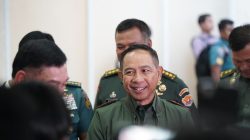Musikilu Mojeed, who serves as the Editor-in-Chief at Premium Times, encouraged reporters to adopt empathetic approaches and trauma-sensitive methods when covering stories about marginalized and vulnerable groups.
As worries escalate about harmful rhetoric in Nigeria’s media landscape, communication specialists along with religious figures are urging reporters to embrace more empathetic, moral, and trauma-aware methods of journalism.
The request was made in Abuja on Wednesday during the 2025 Communications Week event organized by the National Directorate of Social Communication at the Catholic Secretariat of Nigeria (CSN).
Themed “Gentle Media: Charting a Course as Heralds of Hope Amidst an Afflicted Country,” the gathering assembled reporters, learners, spiritual leaders, and communications specialists for talks and dialogues centered on fostering responsible narrative practices and tackling the escalating poison within online environments.
During his speech, Michael Banjo, the Secretary General of the CSN, urged for a more empathetic and accountable media environment as hostility, competition, and hype continue to escalate within the nation’s media sector.
Mr. Banjo outlined the Communications Week as an integral component of a larger initiative by the Catholic Bishops Conference of Nigeria (CBCN) aimed at enhancing media literacy and contemplating the Church’s influence in forming discourses within the digital era.
He stated that the occasion also provides a chance for the Church to consider its duty to “spread the message through media platforms” amid the rising tide of false information and polarizing material.
In discussing the current state of Nigeria’s media landscape, Mr. Banjo expressed concern about the frequency of online conflicts involving prominent individuals, the surge in attention-grabbing material on social platforms, and the practice of using ethnic stereotyping to provoke anger over minor issues.
He stated that even simple declarations regarding events or accomplishments are being distorted to incite hateful rhetoric. This represents a shift away from the principles that characterized the nascent stages of Nigerian broadcasting.
Mr. Banjo praised the expansion of media in Nigeria but encouraged communicators to reassess the core tenets of journalism—truth, respect, and community engagement—as the nation faces increasing social strains and political unrest.
World Communications Day, initiated by the Catholic Church since 1967, is commemorated yearly to prompt contemplation about how media and communications can foster truth, harmony, and respect for human dignity. Every year’s observance follows a specific theme selected by the Pope.
During the event, a posthumous accolade was bestowed upon renowned broadcaster Raymond Dokpesi, acknowledging his significant impact on the media landscape and public service.
Tactfulness, a instrument for ethical reporting
At the event, as he delivered the main speech, Reverend Gerald Musa from the Catholic Diocese of Katsina urged Nigerian journalists to embrace a softer and more empathetic approach in their communications.
Citing both timeless philosophical ideas and contemporary principles of media ethics, Mr. Musa cautioned about the prevailing tendency towards harsh, provocative, and polarizing journalism. He compared this approach to the strong wind in the well-known fable where the wind competes with the sun.
He encouraged the media to emulate the sun, employing warmth, patience, and persistence to foster transformation.
“In the current landscape of media, which frequently acts unpredictably—loudly, polarizing, and urgently—the softer forms of communication wield more influence in transforming perspectives and convictions,” he stated.
Mr. Musa observed that provocative rhetoric and ethnic-religious prejudice prevail across traditional media outlets as well as online platforms, posing a risk to national cohesion.
He
cited
In his 2025 World Communications Day address, Pope Francis highlighted the importance of kindness within media practices. He linked this idea to various communication theories such as agenda-setting, framing, virtue ethics, and peace journalism.
He called upon media proprietors, regulators, and reporters to adopt a communicative approach that safeguards truth and humanity.
The impact of compassion in media
While delivering a talk on the topic, “The impact of empathy in media: Covering marginalized groups,” the Editor-in-Chief of Premium Times, Musikilu Mojeed, encouraged journalists to adopt empathetic and trauma-sensitive approaches when covering underrepresented and vulnerable populations.
Mr. Mojeed, who is also the chief operating officer of the media organization, emphasized that journalists should look beyond mere headlines and numbers to share narratives that respect the humanity of their subjects.
Mr. Mojeed cited instances from his newsroom’s reporting, noting that journalists frequently come across individuals who have experienced sexual violence, been displaced, fallen into poverty, or suffered due to systematic neglect.
He cautioned that in these situations, an indifferent attitude could exacerbate the injuries sustained by those who have been traumatized.
He stated, ‘When individuals in distress consent to converse with us, they aren’t merely allowing us into their narrative; they are entrusting us with their vulnerability.’
He condemned the exploitative approach of certain media outlets, wherein journalists make short visits to communities, gather poignant tales, then depart never to return or check back on the fate of those they spoke with.
Mr. Mojeed additionally urged editors and newsroom heads to improve their support for journalists covering delicate or troubling subjects.
As he puts it, trauma-informed journalism isn’t solely concerned with the way stories are narrated; it also focuses on how reporters themselves are handled throughout the storytelling process.
He urged faith-driven and local media groups to take the initiative in promoting journalism characterized by empathy, precision, and responsibility, particularly as misinformation and hype become more prevalent.
He stated, ‘Simply amplifying voices is insufficient; we must approach this task thoughtfully, providing necessary context, and with a strong sense of duty.’
Provided by Syndigate Media Inc. (
Syndigate.info
).






